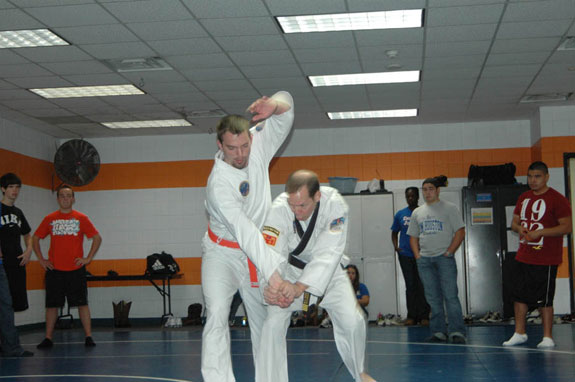Club Offers Self Defense For Future CJ Officers
July 13, 2011
SHSU Media Contact: Elizabeth Kuhles-Heiney
 |
| College of Sciences Associate Dean Marcus Gillespie (right) demonstrates a self-defense move on junior criminal justice major Austin Pomykal for high school students attending the Criminal Justice Summer Camp. |
In preparing for a career as a U.S. Marshal or a Texas Department of Public Safety trooper, junior Austin Pomykal wanted to add self-defense to his resume during his studies in criminal justice at Sam Houston State University. So he joined a Martial Arts Club.
Martial Arts of Sam Houston (MASH) teaches hapkido, a Korean martial art that focuses on self-defense through kicks, punches, strikes and joint locks. The discipline allows for different levels of force, ranging from moderate, to enable one to control an attacker without injury or bruising, to advanced that can cause serious injury or even death.
“It is all about self-defense,” said Marcus Gillespie, a hapkido instructor and associate dean in the College of Sciences. “Hapkido means ‘the way of coordinated power.’”
Hapkido, founded by Choi Yong-Sul in Korea in 1943, is based on a continuous motion theory, the idea that every disengaging technique is followed immediately by a counterstrike, joint lock or throw. This practice is summarized by the saying, “If an opponent grabs you, you grab him.”
There are many forms of martial arts, such as karate, tae kwon do and hapkido, and they are all different. MASH has consistently practiced hapkido for 10 years.
Gillespie and other members of the club recently demonstrated some simple techniques for high school students attending the Criminal Justice Summer Camp. They showed students how to defend against being grabbed, choked and attacked at close range by a weapon. All were achieved without the use of weapons, and Gillespie showed how simple objects, such as keys and a pen, can stave off an attack.
“Sometimes the best action is no action – just give them your money or your car keys,” Gillespie said. “It’s about assessing body language and tone of voice. It’s all about trying to avoid situations that put you in a situation where you might be in danger. Just being aware of your environment helps.”
Pomykal said his training is another tool in his future job as a law enforcement officer and can be more effective than a gun, a taser or a nightstick in dealing with the public. It also could be a plus when applying for criminal justice jobs.
“If you have a black belt, you will be more ‘valuable’ because you will require less training and money,” Pomykal said. “They will have to spend less on you to get you ready.”
Michael Doherty, also a junior majoring in criminal justice, wanted to take a martial arts class, but couldn’t afford the costly academies in his community. At SHSU, he found MASH, which only charges $20 a semester for twice weekly trainings in the discipline. The only other costs are $55 for a uniform, and fees to the American Institute of Modern Hapkido for certifications and belts.
Doherty hopes to use his training in a career in the U.S. Secret Service. He said that while protecting an individual for the federal agency, a small move could deflect potential harm and eliminate the risk completely, without the need to even draw a weapon.
“Personally, after I have seen what it can do, I think it should be emphasized in what we learn,” said Doherty. “It provides more confidence and basic knowledge so you don’t have to have a gun to subdue a suspect or to take control of a situation.”
Pomykal said he saw a video of a Texas State Trooper using a hapkido move to restrain a drunken driver who attacked the officer with a pen during a DWI testing procedure. The officer deflected the weapon and instantly put the suspect in a restraining hold, ready for handcuffs. Pomykal said he also learned techniques that can subdue an aggressive drunk in the field.
While Pomykal said he sees many applications for the discipline in the law enforcement field, he also found the techniques sharpen his thinking skills and reduce his blood pressure, making him better able to act during stressful situations.
“In criminal justice, you are dealing with the public a lot, like in fast food restaurants and gas stations, who can become irate,” Pomykal said “It teaches you the discipline so you can have a higher tolerance for people who are irate. You learn how to control your adrenaline, your heart rate and rage, and to always have your wits about you. It allows you to think before you act.”
Martial Arts of Sam Houston is open to all students, staff and faculty at Sam Houston State University and includes a cross section of participants from every college. The club meets Tuesday and Thursday evening between 5:30 and 7 p.m. in Multipurpose Room 3 at the Health and Kinesiology Building in the fall and spring semesters. For more information, e-mail SamHapkido1@gmail.com or call Pomykal at (254) 721-8505.
- END -
This page maintained by SHSU's Communications Office
Assistant Director: Julia May
Writer: Jennifer Gauntt
Located in the 115 Administration Building
Telephone: 936.294.1836; Fax: 936.294.1834
Please send comments, corrections, news tips to Today@Sam.edu.

 SamWeb
SamWeb My Sam
My Sam E-mail
E-mail

